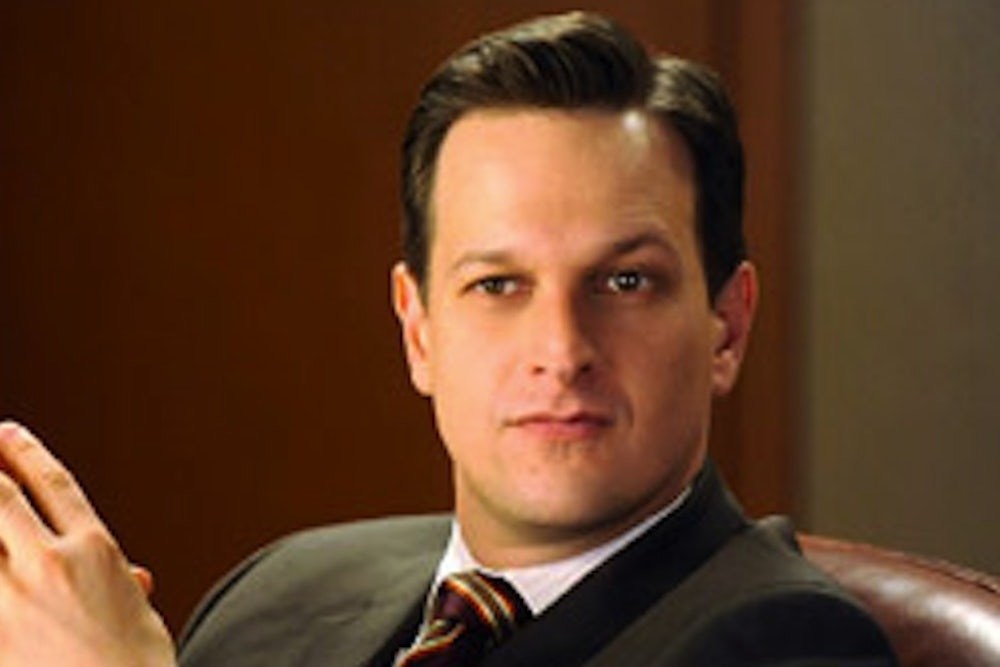“The Good Wife” has collected its share of critical plaudits and Emmy nominations over its five-year run, but even the most ardent praise for the show has usually come with an asterisk attached: “the best thing on TV outside cable,” “the best drama on network television.” Its remarkably sharp, self-assured fifth season, the show’s finest yet, has seemed at times like a direct challenge to TV’s fancypants, faux-prestige dramas (“House of Cards” and “True Detective,” I’m looking at you): Try doing this 22 times a year, with network supervision, backwards in high heels.
But with Sunday night’s shocking plot twist—stop reading here if you’re not caught up—the show suffered in its attempt to mimic the violent, high-stakes TV it competes with on Sunday night. The death of Will Gardner, the rakish lawyer played by Josh Charles, was violent and unexpected—but most of all it seemed a sign that the show was succumbing to that false hierarchy of taste that tells us death is braver and more challenging than workplace drama.
“Game of Thrones,” “Walking Dead,” “Boardwalk Empire” have all made the idea that “nobody is safe” a writers’ room badge of honor. As New York magazine wrote in last year’s list of rules for creating a prestige TV drama, “killing main characters will keep your audience on its toes and telegraph your intention to take dramatic risks.” And it might even get your show trending on Twitter, where audiences have become primed to react to “Holy Shit” moments with shock, grief, and spoiler warnings. What better way to create event television?
Oh my God. SERIOUSLY???? What the FUCK???? You’re killin’ me @GoodWifeWriters !!! The fuck @MrJoshCharles? #TheGoodWife
— Retta (@unfoRETTAble) March 26, 2014“The Good Wife,” though, has never been that kind of show. At its best, it gives the stuff of daily life—flirtations, attraction, professional slights—the narrative tension of a thriller; no other series can imbue a walk down a hallway with such high dramatic stakes.The tightly wound show already upended its basic structure once this season, when Alicia Florick (Julianna Margulies) started her own law firm, breaking off from the office that had been her home, and the series’ main setting, for the past four years. That episode, aptly titled “Hitting the Fan,” was more riveting than any “Red Wedding,” though the only violence committed was against a piece of furniture.
And so when Will was shot 40 minutes into Sunday night’s episode, by a troubled college student he was defending on murder charges, it seemed impossible he would actually die. But then there was his corpse, lying on a gurney, dead on arrival at the emergency room. When the episode finished airing, Michelle and Robert King, the show’s co-creators, issued a public letter, explaining that Josh Charles wanted to move on to other projects when his contract ended. Was this just a bold, risky way of writing off the show’s charming, male lead? It was certainly viscerally painful television, emphasizing the haphazardness and muddle of violence. Suddenly “The Good Wife” had produced a moment as “omg” as any on “Breaking Bad.”
“We’ve always taken as a guiding principle of this show that drama isn’t in the event; it’s in the aftermath of the event,” the Kings wrote in their letter to fans, and I have no reason to doubt that they’ll use this trauma as a catalyst for more emotionally complex storytelling. I don’t expect them to repeat the mistakes of “Downton Abbey,” which dispatched with Matthew Crawley in an end-of-season car crash, then jumped ahead four months to avoid dealing with characters’ grief. (If the preview is any indication, next week’s episode will leave me a sobbing wreck.) Sunday night’s episode proved that the show can compete with the big boys of cable, but for the rest of the season, I hope it remembers that it doesn’t need to.
